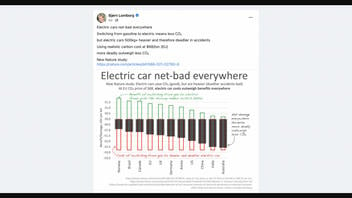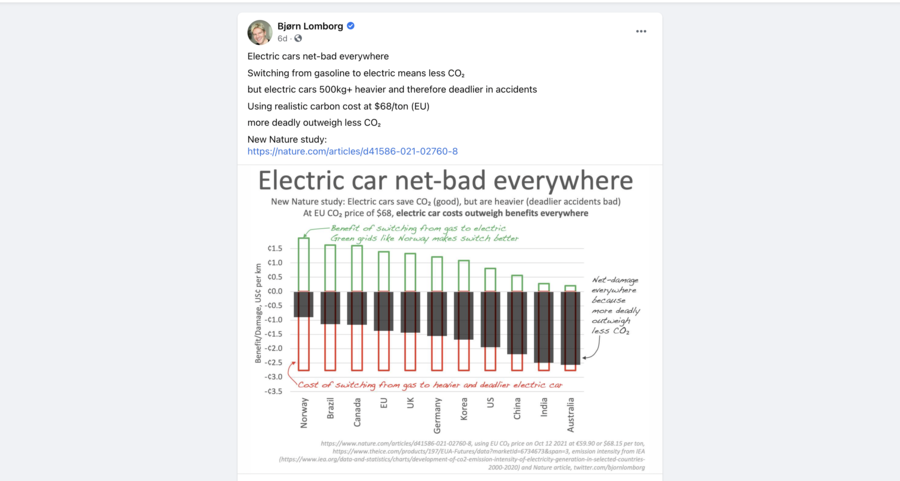
Are electric vehicles having a negative effect on all societies around the world? No, that's not true: The Nature article that the Facebook user links to as support doesn't even agree with the user's claims that electric vehicles (EVs) do more harm than good. The math is correct, but the conclusion the Facebook user came to is not justified.
The claim appeared in a Facebook post (archived here) published by Danish author Bjorn Lomborg on October 13, 2021. The post read:
Electric cars net-bad everywhere
Switching from gasoline to electric means less CO₂
but electric cars 500kg+ heavier and therefore deadlier in accidents
Using realistic carbon cost at $68/ton (EU)
more deadly outweigh less CO₂
New Nature study: https://nature.com/articles/d41586-021-02760-8
This is what the post looked like on Facebook at the time of writing:
Lead Stories spoke to two experts in electric vehicles, Prof. Don MacKenzie and David Reichmuth.
MacKenzie is a civil and environmental engineering associate professor at the University of Washington who Lead Stories asked to review the chart built for the Facebook post. MacKenzie responded to us in an October 22, 2021 email saying:
The short, simple answer is that Lomborg's calculations are correct but his conclusion is not justified.
If the rest of the Shaffer, Auffhammer, & Samaras (SAS) analysis is correct, but their social cost of carbon is too high, then Lomborg's adjustment is correct. His adjustment to the CO2 benefits numbers is properly applied.
But Lomborg's conclusion that EVs are a net bad everywhere is not justified, because the underlying analysis of SAS does not include ALL costs and benefits. It only includes a greenhouse gas benefit and a fatality cost. A complete analysis would include the impacts of other emissions (e.g. SOx, PM, NOx) as well as the costs of injuries, not just fatalities. Without that, no one is justified in saying EVs are a net positive or a net negative for society. What the work by SAS does tell us though, is that the fatality risks from battery weight are significant enough that they should not be ignored.
SOx stands for sulfur dioxide, PM stands for particulate matter, and NOx stands for nitrogen oxides.
MacKenzie is saying that the Facebook user took a major leap by saying that EVs are a net negative when he only pointed out the CO2 emissions. For it to be a complete and balanced assessment, the person who posted the claim needed to looked at all emissions as well as the cost of injuries in electric vehicle accidents.
Reichmuth is a senior engineer working in the Clean Transportation program of the Union of Concerned Scientists. He told Lead Stories in an October 19, 2021 email:
What I can say is the authors of the study in question appear to disagree with Mr. Lomborg's characterization of the study. The final paragraph of the Nature article is: "Ultimately, to manage climate change, the world needs to stop emitting greenhouse gases from vehicles and power plants. Electric vehicles powered from a clean grid are an essential step in the right direction. A focus on driving lighter, safer, cleaner and less can ensure a better future for everyone."





















